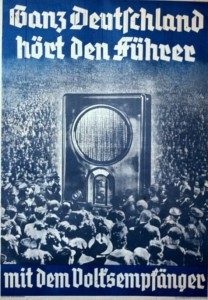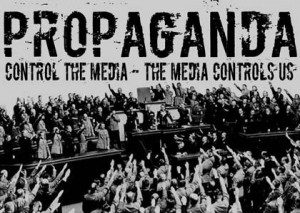Nazism appeared to offer Germans a bright future. The Nazis wanted to harness as much emerging technology as possible. One example of this is the radio. Although not directly innovated by the Germans, they were able to utilize the “new” technology and made it popular with ordinary citizens. The Germans were able to politically exploit the new device in order to get important information across to thousands of citizens.
However, early in the history of the radio, few people received messages because not everyone had access to one. After Hitler’s rise to power in the early 1930s, the radio became a perfect political medium. Goebbels was quoted to saying that the radio was “the most influential and important intermediary” (204). In order to expand listenership, the device had to be affordable to all income levels throughout the Third Reich. Marketing played a critical role in bringing the radio to nearly every home throughout Germany. A few different models were created to cater to the various income levels.

Although politics were discussed over the radio lines, they were by no means the only things transmitted. German radio stations played classical and popular music, sports, poetry recitals, and cultural discussions. The Olympic games held in Berlin in 1936 were also broadcast over the radio. German radio catered to a wide array of tastes, which helped achieve large listenership.

There was also some competition from foreign countries trying to broadcast in Germany. Stations from London and Russia could be received by some radios. The BBC from London was a key platform that received a high number of listeners on a daily basis, even though Nazi law forbade this practice. In closing, the radio was a vital tool used during the Second World War. It allowed for information to travel quickly to thousands, if not millions, of German citizens. It allowed the Nazi Party to communicate changes in laws or changes in the war. It also allowed for Germans to hear the news from an alternate perspective, such as the BBC. The radio served as a propaganda tool, which truly led to its status as “the eighth Great Power” (219).
